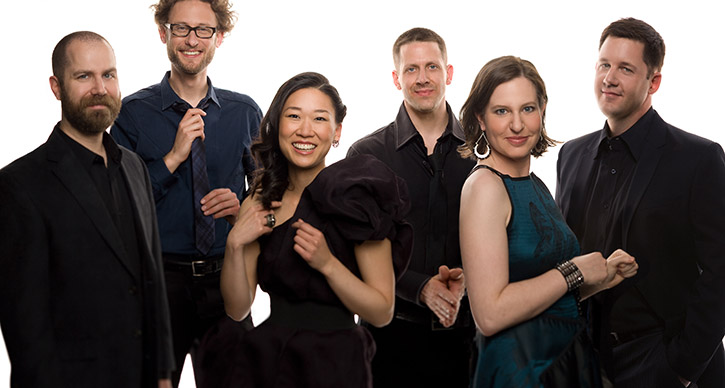UMS Playlist: Evolution of Chamber Music
This post is a part of a series of playlists curated by UMS staff, artists, and community. Check out more music here.

eigth blackbird. Photo by Luke Ratray.
The Chicago-based chamber ensemble eighth blackbird performs in Ann Arbor on January 17. eighth blackbird is on the new frontier of contemporary music. As Los Angeles Times explains, “the blackbirds are examples of a new breed of super-musicians. They perform the bulk of their new music from memory. They have no need for a conductor, no matter how complex the rhythms or balances… [They are] stage animals, often in motion, enacting their scores as they play them.”
How did chamber music, which originated in the Middle Ages, evolve into the music of the blackbirds? Explore the history with our listening guide:
1. Chamber music originated during the Middle Ages as a form of entertainment for guests in palace chambers. “Mille Regretz” by Josquin des Prez (1450-1521) is an example of the style and structure of sacred music translated to a secular song that describes the pain of a lost love. The earliest chamber music often also included lutes, recorders, and early versions of the violin, viola, and cello.
2. The string quartet, one of the most common chamber ensembles, developed into its current form in the early 17th century. Since then, composers from Haydn to Beethoven to Shostakovich have revered the string quartet’s form because of the challenge of writing four unique parts that constantly change and interact with one another. The string quartet includes two violins, viola, and cello. In this track, listen for Beethoven’s mastery of “counterpoint,” the relationships between the voices.
3. Chamber music in the 20th century brought together new instrument groupings. The brass (featuring two trumpets, trombone, French horn, trombone, and tuba) rose in popularity in the 1940s. Victor Ewald is widely considered to the first composer of brass quintet music.
4. Chamber music concepts extend across genre; though “chamber music” is primarily used to describe classical music, the John Coltrane Quartet exemplifies excellent chamber music playing.
5. eighth blackbird illustrates the vast range of 21st century chamber ensembles. On this track, the group performs Steve Reich’s minimalist composition “Fast: 8:39.”
6. eighth blackbird showcases its virtuosic ensemble connectivity with Thomas Adés’ rhythmically complex “Catch.”
7. eighth blackbird collaborates with electronic music composer Dennis Desantis on the track “strange imaginary remix.”
What did you think about this playlist? Share your thoughts or song suggestions in the comments below.






